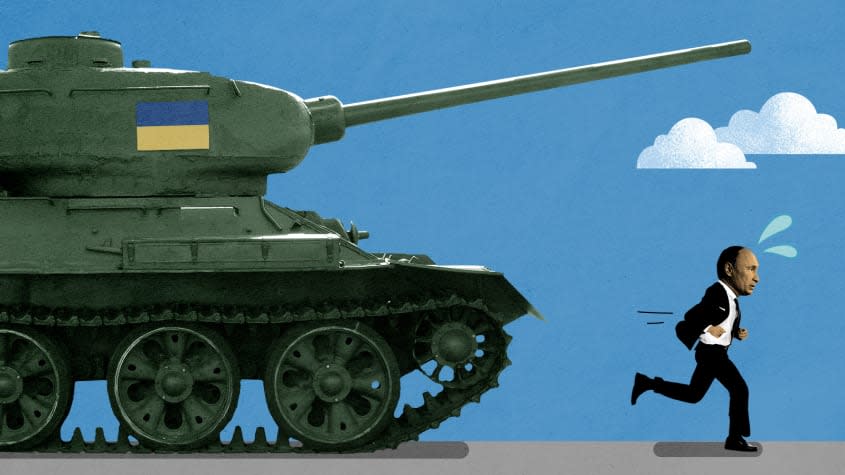Ukraine is finally pushing back Russia's invasion. Will that turn the tide of the war?

- Oops!Something went wrong.Please try again later.
Ukraine's military, after months of slowly losing ground to Russian invaders in the eastern Donbas region, went on the offensive in late August, launching a slow counteroffensive to try and recapture the southern Kherson province. A week after starting its attack in the south, Ukrainian forces surprised Russia by striking in the northeastern Kharkiv province and even making limited advances in eastern Luhansk province, Russia's main prize from its summer campaign.
"The dual offensives in eastern and southern Ukraine" are just "the latest sign that Ukraine's defenders are seizing the military initiative" and "increasingly forcing Russia to react" to their military strategies, The Wall Street Journal reports. Has Ukraine actually tipped the scales from defeat — or at least deadlock — to victory in Russian President Vladimir Putin's war?
Ukraine is definitely winning
"The fate of Kherson remains to be determined," but "the larger trend is not in dispute: Ukraine is winning its war of independence," Max Boot argues at The Washington Post. "The major issue now is how much of its territory it can claw back. The existence of a democratic, pro-Western Ukrainian state is no longer in doubt. Russian dictator Vladimir Putin's war plans have failed miserably."
Ukraine's "dual offensives" in Kherson and Kharkiv "show how the country's military is increasingly forcing Russia to react to its moves," the Journal reports. "Ukraine's forces are growing gradually stronger as the country receives advanced weapons from the U.S. and other Western countries, while Russia is struggling to deploy extra well-trained manpower after suffering heavy losses since it launched its full-scale invasion in February."
Putin failed to capture Kyiv, then watched his Plan B to capture the Donbas run out of steam and manpower, and now Ukraine's "slow-motion offensive" is eating into Russia's small gains, Boot writes. "More than six months into Putin's 'war of choice,' Russia's probable defeat is coming into focus. What remains to be determined is the magnitude and impact of that defeat."
Don't underestimate Russia's might
Russia still has a big advantage in potential troop strength and the quantity of artillery and shells, and Ukraine is taking heavy losses. Soldiers recovering in hospitals in southern Ukraine recounted to The Washington Post "the lopsided disadvantages their units faced in the early days of a new offensive to expel Russian forces from the strategic city of Kherson."
A group of nine wounded soldiers told the Post how Russian drones flying out of hearing range informed Russia's entrenched forces where to fire on Ukraine's volunteer brigades, Russian tanks would appear from cement fortifications to blast infantry then disappear under cement fortifications, Russian artillery would fire endless rounds using automatic targeting radar while Ukraine had to conserve shells, and Russian hacking tools rendered Ukraine's drones useless.
"They used everything on us," a 33-year-old Ukrainian soldier named Denys told the Post. "Who can survive an attack for five hours like that?"
Russia has "lost nothing and are not going to lose anything" in the Ukraine "special operation," Putin said in a speech Wednesday.
The fate of Ukraine is still up in the air
There is "no certain final outcome in view" in Ukraine's battle against Russia's invaders, Gen. Valeriy Zaluzhnyi, commander of Ukraine's armed forces, and Lt. Gen. Mykhailo Zabrodskyi wrote in a strategy paper published Wednesday.
"The Armed Forces of Ukraine, in the best-case scenario, are able to employ outdated launchers and strike no farther than the depth of the enemy's operational rear," and only when Ukraine gets longer-range weapons "can we get to a turning point in the ongoing war," Zaluzhnyi and Zabrodskyi write. "If Ukraine succeeds in receiving the appropriate weapons, operational and strategic prospects for 2023 will look totally different. The very threat of the Ukrainian Armed Forces employing means of destruction of the appropriate range will force Russia to reconsider the nature, course, and outcome of the ongoing confrontation."
"There is no room for complacency," Boot agrees in the Post. "Ukraine can prevail only if it continues to receive substantial Western aid, and it needs even more assistance (fighter aircraft, long-range rockets, and tanks) to complete the liberation of its soil." But Russia is already feeling the cost of Western sanctions, and if Ukraine can retake Kherson or strike another blow against Russian occupiers, he predicts, "it could shake Putin's criminal regime to its foundations."

